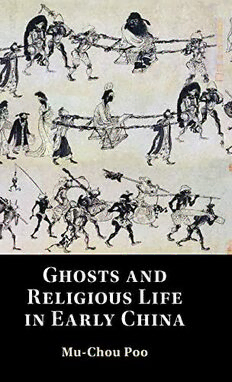
Ghosts and Religious Life in Early China PDF
Preview Ghosts and Religious Life in Early China
Ghosts and Religious Life in Early China For modern people, ghost stories are no more than thrilling entertain- ment.Forthoselivinginantiquity,ghostswerefarmoreseriousbeings, astheycouldaffectthe lifeanddeathof peopleandcauseendlessfear andanxiety.Howdidancientsocietiesimaginewhatghostslookedlike, what they could do, and how people could deal with them? From the vantage point of modernity, what can we learn about an obscure, but no less important aspect of an ancient culture? In this volume, Mu-ChouPooexplorestheghostsofancientChina,theideasthatthey nurtured, and their role in its culture. His study provides fascinating insights into the interaction between the idea of ghosts and religious activities, literary imagination, and social life devoted to them. Comparing Chinese ghosts with those of ancient Egypt, Mesopotamia, Greece, and Rome, Poo also offers a wider perspective on the role of ghostsinhumanhistory. Mu-ChouPooisProfessorofHistoryattheChineseUniversityofHong Kong. He is the author of In Search of Personal Welfare: A View of Ancient Chinese Religion (1998), Enemies of Civilization: Attitudes towardForeignersinAncientMesopotamia,Egypt,andChina(2005), WineandWineOfferingintheReligionofAncientEgypt(2014),and DailyLifeinAncientChina(2018). Ghosts and Religious Life in Early China MU-CHOU POO ChineseUniversityofHongKong UniversityPrintingHouse,Cambridgecb28bs,UnitedKingdom OneLibertyPlaza,20thFloor,NewYork,ny10006,USA 477WilliamstownRoad,PortMelbourne,vic3207,Australia 314–321,3rdFloor,Plot3,SplendorForum,JasolaDistrictCentre, NewDelhi–110025,India 103PenangRoad,#05–06/07,VisioncrestCommercial,Singapore238467 CambridgeUniversityPressispartoftheUniversityofCambridge. ItfurtherstheUniversity’smissionbydisseminatingknowledgeinthepursuitof education,learning,andresearchatthehighestinternationallevelsofexcellence. www.cambridge.org Informationonthistitle:www.cambridge.org/9781316514672 doi:10.1017/9781009086523 ©CambridgeUniversityPress2022 Thispublicationisincopyright.Subjecttostatutoryexception andtotheprovisionsofrelevantcollectivelicensingagreements, noreproductionofanypartmaytakeplacewithoutthewritten permissionofCambridgeUniversityPress. Firstpublished2022 AcataloguerecordforthispublicationisavailablefromtheBritishLibrary. isbn978-1-316-51467-2Hardback CambridgeUniversityPresshasnoresponsibilityforthepersistenceoraccuracy ofURLsforexternalorthird-partyinternetwebsitesreferredtointhispublication anddoesnotguaranteethatanycontentonsuchwebsitesis,orwillremain, accurateorappropriate. Contents Preface pagevii 1 Ghosts:The Other Side of Humanity 1 1.1 Talking about Ghosts 1 1.2 Cross-CulturalTypologies ofGhosts 8 1.3 Looking for Ghostsin Early China 12 1.4 The Structure ofThisBook 16 2 The Emergence of Ghostsin Early China 21 2.1 The Meaning and Originof Gui,or Ghost 23 2.2 The Image ofGhosts 31 2.3 The Relationship between Ghosts and Human Beings 37 2.4 Ritual Actsand Exorcism 40 2.5 The Religious and Social Background of the Concept of Ghosts 49 3 Imperial Order and LocalVariations 57 3.1 The Nature ofthe Qin-HanOfficial Religion 60 3.2 Belief inGhosts intheQin-Han Period 63 3.3 The Nuo, orExcorcism 74 3.4 Ghosts and the Netherworld 78 3.5 The Changing Image of Ghosts 82 4 Stories That Revealthe Dark Corner 89 4.1 Pursuing Ghosts intheZhiguai 89 4.2 The Typology ofGhosts 92 4.3 The Intentionality of Ghost-Story Writers 101 4.4 The Religious Significanceof Ghost Stories 119 v vi Contents 5 Ghosts in Early DaoistCulture 126 5.1 The Originof GhostsAccording to Daoist Belief 128 5.2 Imagesof Ghosts 133 5.3 ExorcisticRituals 135 5.4 New Ghostsor Old? 146 6 The Taming of Ghostsin Early Chinese Buddhism 150 6.1 The TermGui,or Ghost,in Early BuddhistTexts 153 6.2 The Tamingof Ghostsin Early Buddhism 160 6.3 Competition with IndigenousBelief Systems 163 6.4 The Origins of Ghostsin BuddhismCompared 168 7 Chinese Ghostsin Comparative Perspective 170 Bibliography 190 Index 205 Preface Itisironicthat,afteryearsoflivingwithapersonwithpassionforlifeand rigorous intellectual examination of things around us, I should write something about ghosts, something that death brings about, and some- thingamorphousthatoftendefiesreasonandrationalexplanation.There has to be a good reason for someone to spend a long time trying to describe the history of ghosts in any culture, let alone trying to establish somegeneralunderstandingofghostsinhumansocieties,pastorpresent. For one thing, the idea of ghosts is very much alive and even thriving in somepartoftheworld.Themetaphoricaluseoftheideaofghostscanbe evenmorepervasive.Thusonecanscarcelyexpecttoreachanyconsensus regarding the ramifications of the idea of ghosts in human societies, ancient or modern. Yet it seems that ghosts are important constituents of human cultures and societies, and very few societies could claim to havenotdevelopedsomesortofideaaboutghosts,aboutthepostmortem existenceofhumanbeings.Inordertohavearoundedunderstandingofa peopleoraculture,itseemslogicaltoinvestigatewhatpeoplethinkabout the living aswellas the dead. Of course, whether or why one should engage in such an effort is not necessarilyatotallyrationalorobjectivematter.Thisbookcanbesaidto haveoriginatedfrommypersonalfascinationaboutbelief,faith,andthe phenomenon of religion, within which the idea of ghosts has occupied a role. How should we understand the phenomenon that is now called “religion”? And how to explain the tug-of-war between the human and the extra-human forces that constituted the history of religions, and indeed historyatlarge? vii viii Preface Asahistorian,Iammoreinterestedinthehistoricalandsociocultural ramifications of religion in human societies. Although I do not have the proper training to tackle religion in all its spiritual, philosophical, or theological aspects, yet the fascination about religion led me to seek for a less conventional way to study things religious. Not by asking what is the nature and purpose of the divine, or whether god or gods exist, I found my focus on the phenomenon of ghosts, not only in Chinese society but also in other societies. This is because, as I try to articulate inthisbook,theideaofghostsisalmostaspervasiveasgod(s)inhuman societies, yet not enough attention seems to have been paid to this phe- nomenon. How did the idea of ghosts originate, how did it impact each society,andhow couldit helpus to further understand humanity? Sothisbookiswrittenwithcomparisoninmind,althoughneithermy training nor the space in this book allows me to engage in a full-scale comparison with other societies. I did, however, try to make some pre- liminary comparative observations in the first and final chapters so that theChinesestorycouldbeplacedinapropercontextofmultiplesocieties. These observations are meant to be invitations for interested scholars to jointhediscussion,andhavebynomeansexhaustedallthequestionsand issuesthatcan be investigated. Most of the material in this book has previously been presented in various forms as book chapters, articles, conference papers, or invited talks; thus, I have received criticism and help from numerous colleagues and students, for which I am very grateful. Here I like to thank the anonymous reviewers who helped to correct many mistakes and revised someofmyunderstandingofthesources.Forallitsshortcomings,Ihope this book might perhaps serve as a beginning for more in-depth studies that could advance our general goal of understanding humanity. Last, I would like to dedicate this book to my life partner Ping-chen, who constantly reminds me how far I am still away from what I claim to be pursuing.
